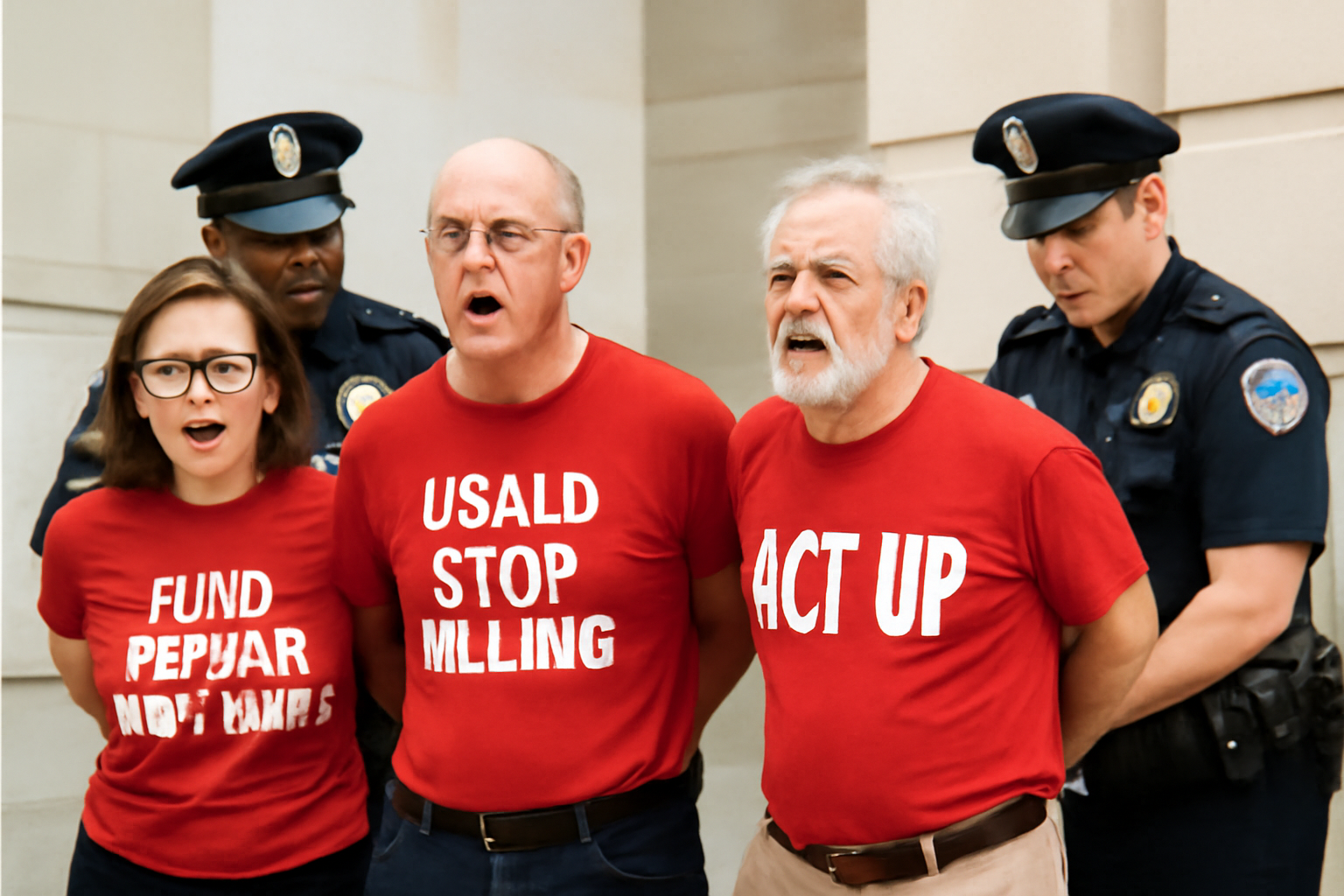
In a dramatic turn of events on Capitol Hill, five prominent HIV/AIDS advocates were apprehended by Capitol Police on Thursday after they disrupted a House Foreign Affairs Committee hearing. The session was primarily focused on the operations and budget of the U.S. Agency for International Development (USAID).
The activists, who included Asia Russell, the Executive Director of Health GAP; Charles King, the CEO of Housing Works; and Eric Sawyer, a co-founder of ACT UP NY, made their presence felt during the hearing. They began chanting slogans such as "PEPFAR saves lives. Restore AIDS funding now" shortly after Max Primorac, a senior research fellow at the Heritage Foundation's Margaret Thatcher Center for Freedom, started his testimony. Alongside their vocal protests, they held posters that accused the Trump-Vance administration of endangering lives worldwide due to cuts in AIDS funding.
Their protest was in response to significant policy changes enacted by the administration. As of last month, nearly all U.S. foreign aid had been frozen for at least 90 days by the current administration. Although Secretary of State Marco Rubio later issued a waiver allowing PEPFAR (the President's Emergency Plan for AIDS Relief) and other critical humanitarian programs to continue operation during this period, the uncertainty had already caused severe disruptions. Reports indicated that PEPFAR-funded projects across Africa, including those in Kenya, had to suspend or even cease operations due to the sudden financial shortfall.
These developments have had far-reaching implications, particularly for the global movement advocating for LGBTQ rights. The perceived strategy to dismantle USAID, coupled with the hiatus on foreign aid, has been described by some activists as disastrous. It has not only jeopardized health services but also threatened the progress made in protecting human rights globally.
Following the arrest of the activists, U.S. Representative Brian Mast, who chairs the House Foreign Affairs Committee, commented on the incident. He remarked that the funding for PEPFAR had already been reinstated, suggesting that the protestors were perhaps not fully informed about the latest developments. "Somebody better give 'em a link to... I don't know, maybe Fox News or something like that," he quipped, after Capitol Police cleared the room.
Implications of the Funding Freeze
The freeze on foreign aid has sparked widespread concern among international organizations and advocates who rely on U.S. support to combat global health crises. While some funds were eventually restored for lifesaving programs like PEPFAR, the initial suspension has highlighted the fragility of such funding in times of political change.
PEPFAR, established in 2003, has been hailed as one of the most successful global health initiatives, saving millions of lives and preventing countless HIV infections. The program's interruption, even temporarily, can have devastating effects on communities already struggling with the impacts of the HIV/AIDS epidemic.
Russell and King, who were also among the dozens of protesters rallying outside the State Department earlier this month, have been vocal about the need for a full restoration of PEPFAR funding. Their efforts underline the critical role activists play in holding governments accountable for their commitments to global health and human rights.
The protest at the House Foreign Affairs Committee is a testament to the urgency with which advocates are operating. As they continue to mobilize, their message remains clear: the U.S. must maintain its leadership role in the fight against HIV/AIDS, and any cuts to crucial programs like PEPFAR are unacceptable.
In the aftermath of the arrests, discussions have been reignited about the broader implications of U.S. foreign aid policies, especially under the Trump-Vance administration. Many in the international community are watching closely, concerned about how these domestic policy shifts might affect America's role on the global stage.
The activists' steadfast commitment to their cause, even in the face of arrest, highlights a broader narrative – one that stresses the importance of sustained advocacy and the power of grassroots movements in effecting change.
As the situation develops, stakeholders remain hopeful that dialogue between policymakers and advocates will lead to a more consistent and reliable flow of aid, ensuring that the progress achieved over decades is not undone.
Related Posts
Trump Inaugurated as 47th President Amid Concerns for LGBTQ+ Community
Donald Trump has been sworn in as President once again, marking his second term as America's 47th leader. This significant event in U.S. politics promises profound impacts, especially concerning LGBTQ+ rights. Taking office: promises and challenges Amidst a harsh winter storm, Trump took his oath indoors at U.S. Capitol on January 20. Alongside him, Vice-President JD Vance also stepped up, both [...]
Daniel Craig's "Queer" Overlooked by BAFTA: A Surprising Omission
Daniel Craig's film, Queer, snubbed by BAFTAs despite rave reviews In a surprising twist, Daniel Craig's newest film, *Queer*, failed completely on BAFTA's nomination list this year. It's a head-scratcher, considering how critics have sung its praises and Craig delivered such a standout performance. Yet, not a single nod from BAFTA. Go figure. fans and critics baffled by BAFTA snub The exclusio [...]
Generations of LGBTQ+ Athletes: From Past Challenges to Modern Triumphs
In a captivating display that brought together voices across generations, two gay athletes from different times came together on a TV show, sharing their journeys and thoughts on LGBTQ+ representation in sports. This insightful program shed light on how inclusivity and acceptance in athletics have evolved over time. Connecting past and present: The stories behind Andrew Purchas and Davis Atkin L [...]